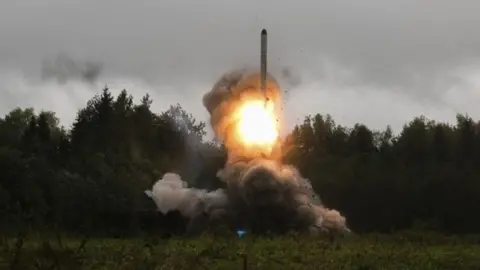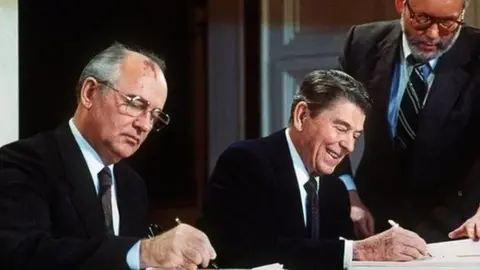Nato accuses Russia of breaking nuclear missile treaty
 EPA
EPAWestern military alliance Nato has formally accused Russia of breaching the 1987 Intermediate-range Nuclear Forces (INF) Treaty, which banned land-based nuclear missiles in Europe.
Following a meeting, Nato foreign ministers issued a statement supporting US accusations of Russian violations.
The US has threatened to withdraw from the treaty because of Russian actions.
Russia denied being in breach of the INF deal, saying it "strictly abides" by its conditions.
The deal banned ground-launched medium-range missiles with a range of 500-5,500km (310-3,400 miles).
"Allies have concluded that Russia has developed and fielded a missile system, the 9M729, which violates the INF Treaty and poses significant risks to Euro-Atlantic security," the Nato foreign ministers' statement reads.
"We strongly support the finding of the United States that Russia is in material breach of its obligations under the INF Treaty.
"We call on Russia to return urgently to full and verifiable compliance. It is now up to Russia to preserve the INF Treaty."
The new medium-range missile that the US - and now Nato - accuse Russian of deploying would enable Russia to launch a nuclear strike at Nato countries at very short notice.
Analysts say Russia sees such weapons as a cheaper alternative to conventional forces.
Speaking after the Nato statement was issued, US Secretary of State Mike Pompeo said Russia had 60 days to return to compliance with the treaty, after which time the US would suspend its own compliance.
"During this 60 days we will still not test or produce or deploy any systems, and we'll see what happens during this 60-day period," he said.
"We've talked to the Russians a great deal. We're hopeful they'll change course, but there's been no indication to date that they have any intention of doing so."
Russian foreign ministry spokeswoman Maria Zakharova was quoted by Interfax news agency as responding: "Russia strictly abides by the provisions of the [INF] treaty, and the American side knows this."

'Enough is enough'
By defence correspondent Jonathan Marcus, at Nato HQ in Brussels
The INF Treaty was a high-point for Cold War arms control in that it abolished a whole category of land-based missiles.
But for several years now the US has been increasingly concerned at what it says are Russian efforts to breach the agreement.
Russia, the Americans claim, has now deployed multiple battalions of new missiles threatening targets in Europe. And they have now decided enough is enough, giving Moscow a clear deadline of 60 days to come back into compliance or the US will itself cease to honour its terms.
Nato allies here share Washington's concerns and have backed the US position, thankful perhaps that it includes this short grace period during which Russia might change its mind.
But the chances of that are slim. And the fear is that the collapse of the INF agreement could help to unravel the whole system of arms control treaties, which have been so important in maintaining strategic stability.

In 2014, then US President Barack Obama accused Russia of breaching the INF Treaty after it allegedly tested a ground-launched cruise missile.
He reportedly chose not to withdraw from the treaty under pressure from European leaders, who said such a move could restart an arms race.
The last time the US withdrew from a major arms treaty was in 2002, when President George W Bush pulled the US out of the Anti-Ballistic Missile Treaty, which banned weapons designed to counter ballistic nuclear missiles.
His administration's move to set up a missile shield in Europe alarmed the Kremlin, and was scrapped by the Obama administration in 2009. It was replaced by a modified defence system in 2016.

What is the Intermediate-Range Nuclear Forces (INF) Treaty?
 AFP
AFP- Signed by the US and the USSR in 1987, the arms control deal banned all nuclear and non-nuclear missiles with short and medium ranges, except sea-launched weapons
- The US had been concerned by the Soviet deployment of the SS-20 missile system and responded by placing Pershing and cruise missiles in Europe - sparking widespread protests
- By 1991, nearly 2,700 missiles had been destroyed
- Both countries were allowed to inspect the other's installations
- In 2007, Russian President Vladimir Putin declared the treaty no longer served Russia's interests
- The move came after the US withdrew from the Anti-Ballistic Missile Treaty in 2002
